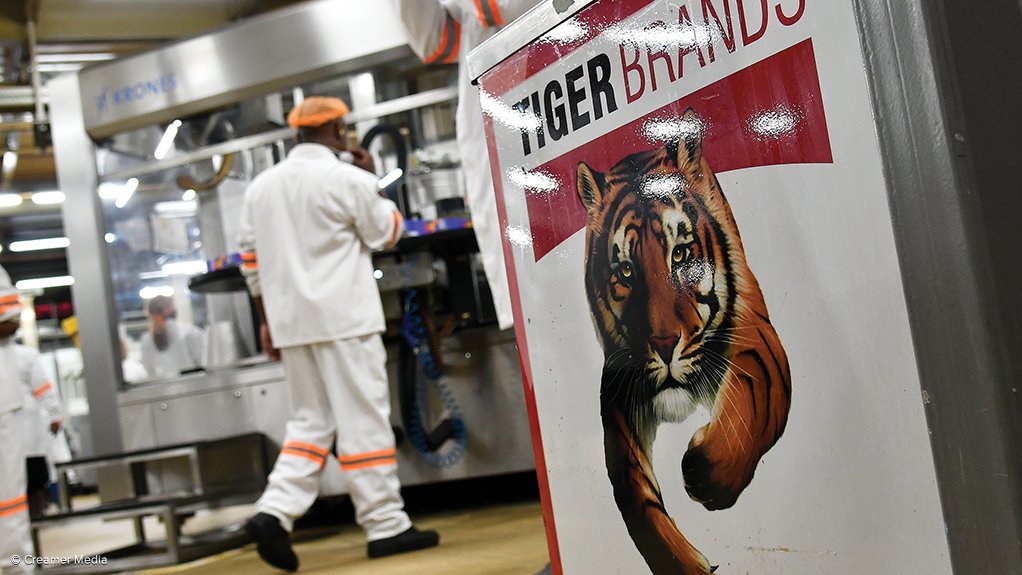Tiger Brands taking strain amid loadshedding, rising costs, flat demand
The JSE share price of branded food, home care and personal care products manufacturer Tiger Brands fell by nearly 16% on May 30, following the release of its financial results for the six months ended March 31.
The group’s net profit decreased to R1.19-billion, from R1.23-billion in the six months ended March 31, 2022.
Revenue increased by 16% year-on-year to R19.4-billion, driven by price inflation of 17% and a 1% overall volume decline, while group operating income declined by 9% to R1.4-billion.
The group's operating margin declined to 7% from 8.9%, while earnings a share increased by 2% to 749c and headline earnings a share increased to 731c, from 729c in the prior comparable period.
"Despite strong revenue growth, Tiger Brands’ six-month performance was impacted by a challenging operating environment owing to prolonged periods of loadshedding, while high levels of inflation and lower disposable income adversely impacted consumer behaviour in terms of volumes and basket mix," the company said.
Further, total earnings were impacted by lower insurance proceeds received relative to the prior year, as well as higher financing costs. Excluding the impact of these proceeds, group operating income declined by 2% and group operating margins decreased to 6.9% from 7.9%, it noted.
"Volumes held steady in the domestic business, driven by a strong volume recovery in bakeries, snacks and treats, and personal care, as well as good performances in sorghum breakfast, rice, beverages and out-of-home.
"However, volume declines were recorded in flour to retail and wholesale customers, sorghum beverages, groceries and baby, with a marginal decline in home care," Tiger Brands said.
Domestic revenue increased by 16% to R17.3-billion, driven by price inflation, while volumes remained flat. All domestic segments recorded revenue growth underpinned primarily by price. Overall, domestic operating income declined by 9% to R1.2-billion.
The company declared an ordinary interim dividend of 320c a share, which will be paid out of income reserves.
Further, all segments of its consumer brands delivered top line growth, with a particularly strong performance from snacks and treats as this business recovered from the impact of industrial action in the prior period.
Out-of-home and beverages also achieved solid revenue growth, while the groceries and baby segments were impacted by lower category demand.
"Overall revenue in this [consumer brands] segment increased by 10%, comprising price inflation of 10%, while volumes remained unchanged. Operating income declined by 15% to R555-million, driven by the underperformance of groceries and baby," the company said.
Groceries delivered a muted top line performance as consumers diverted spend to essential items. Revenue remained largely unchanged at R3.4-billion, with price inflation of 10% being offset by an equal decline in volumes. This was driven by an element of customer overstocking at the start of the period, exacerbated by category volume declines across most segments.
Further, specific raw material shortages related to peanuts, vinegar, tomato paste and peas resulted in factory under-recoveries. Together with significant raw material and packaging cost increases, this led to operating income declining by 57% to R126-million for the groceries segment.
"Demand is expected to remain muted in the second half and although raw material supply challenges are expected to continue, they are likely to have less of an impact. Product mix will be a primary focus area while distribution gains in innovation are expected to drive growth. Marketing efforts will be sustained to drive consumer demand while supporting brand equity. Cost-saving initiatives already in progress will further support a recovery," Tiger Brands said.
Meanwhile, the firm recovery in export volumes was offset by a significant decline in deciduous fruit volumes, it added.
"Although cost-saving initiatives and supply chain efficiencies are delivering ahead of plan, these were not enough to counter the high level of input cost inflation, further impacted by the cost of operating in a constrained electricity environment.
"The total cost of loadshedding amounted to R76-million for the period, up from R12-million in the corresponding period in 2022, resulting in incremental energy costs of R48-million. As a result, gross margins declined to 27% from 29.2%."
Net financing costs for the six-month period amounted to R94-million compared with R34-million in the 2022 interim period as a result of higher financing costs owing to higher average debt levels and higher interest rates.
Further, cash generated from operations was affected by higher working capital investment primarily owing to an increase in trade receivables while the past year’s share buy-back programme impacted opening cash balances.
Tiger Brands incurred a net foreign exchange loss of R15-million, which resulted from the strengthening of the rand against other major currencies, negatively impacting the translation of foreign currency balances. In the same period in the prior year, there was a net foreign exchange gain of R5-million.
OUTLOOK
With consumer confidence continuing to decline, stubbornly high levels of food inflation and a significant increase in interest rates, consumers are becoming more value-conscious, and price elasticities are rising.
Additionally, although a significant reduction in certain internationally priced commodities is anticipated, this is currently being offset by rand weakness, while operating costs are expected to rise significantly as a consequence of higher levels of loadshedding during the winter season, Tiger Brands said.
"In a low- to no-growth environment, our efforts will prioritise efficiency improvements and cost reduction initiatives in order to meet the consumers’ need for affordability. In addition, we will continue to focus on enhancing our penetration and performance in the general trade, while sustaining the positive share gains in modern trade."
Further, improving the performance of the groceries, bakeries and rice segments will be prioritised in the short term.
"Nevertheless, should current operating conditions persist, maintaining full-year operating income in line with last year will be challenging.
"Despite the immediate headwinds, we will continue to balance short-term impact with long-term growth without compromising the future sustainability of the business. To this end, we will continue to invest in our facilities, our brands, our innovation and digital capabilities, as well as our people," it said.
Comments
Announcements
What's On
Subscribe to improve your user experience...
Option 1 (equivalent of R125 a month):
Receive a weekly copy of Creamer Media's Engineering News & Mining Weekly magazine
(print copy for those in South Africa and e-magazine for those outside of South Africa)
Receive daily email newsletters
Access to full search results
Access archive of magazine back copies
Access to Projects in Progress
Access to ONE Research Report of your choice in PDF format
Option 2 (equivalent of R375 a month):
All benefits from Option 1
PLUS
Access to Creamer Media's Research Channel Africa for ALL Research Reports, in PDF format, on various industrial and mining sectors
including Electricity; Water; Energy Transition; Hydrogen; Roads, Rail and Ports; Coal; Gold; Platinum; Battery Metals; etc.
Already a subscriber?
Forgotten your password?
Receive weekly copy of Creamer Media's Engineering News & Mining Weekly magazine (print copy for those in South Africa and e-magazine for those outside of South Africa)
➕
Recieve daily email newsletters
➕
Access to full search results
➕
Access archive of magazine back copies
➕
Access to Projects in Progress
➕
Access to ONE Research Report of your choice in PDF format
RESEARCH CHANNEL AFRICA
R4500 (equivalent of R375 a month)
SUBSCRIBEAll benefits from Option 1
➕
Access to Creamer Media's Research Channel Africa for ALL Research Reports on various industrial and mining sectors, in PDF format, including on:
Electricity
➕
Water
➕
Energy Transition
➕
Hydrogen
➕
Roads, Rail and Ports
➕
Coal
➕
Gold
➕
Platinum
➕
Battery Metals
➕
etc.
Receive all benefits from Option 1 or Option 2 delivered to numerous people at your company
➕
Multiple User names and Passwords for simultaneous log-ins
➕
Intranet integration access to all in your organisation




















